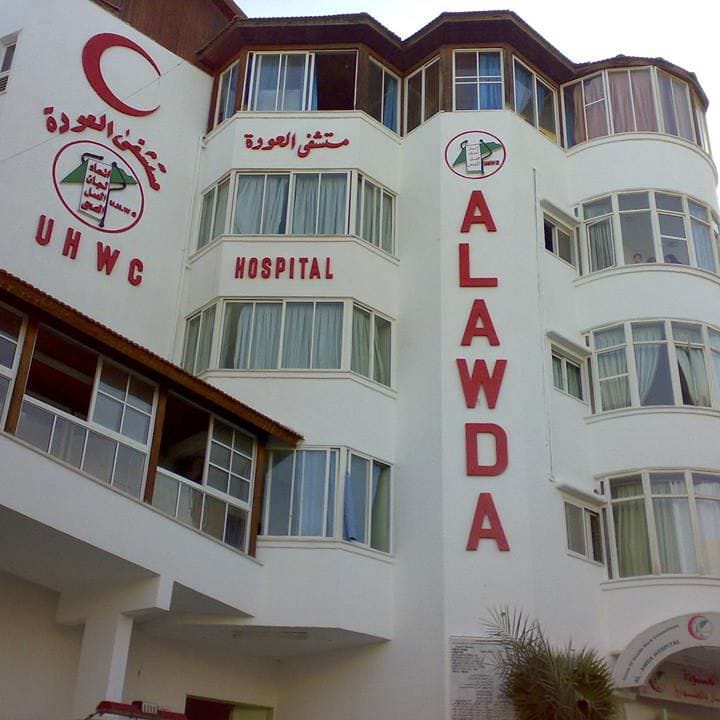The critical shortage of fuel in Gaza is gravely impacting hospitals and affecting pregnant women’s ability to access vital healthcare. Hospitals are warning that vital life-saving equipment might be forced out of action if they do not receive sufficient fuel supplies quickly, while women have told ActionAid that they were forced to walk to the hospital to give birth because the lack of fuel meant no transport was available.
Nuha’s daughter-in-law gave birth at Al-Awda Hospital in northern Gaza, which is run by ActionAid’s partner Al-Awda and recently resumed services despite a brutal 13-day siege by the Israeli military that damaged much of the hospital. Describing her relative’s journey to give birth, Nuha said:
“Unfortunately, there was no ambulance available to take her due to the shortage of fuel…We had to walk her all the way to the hospital.
It is a well-known fact that fuel is scarce. It is needed for the generators to continue working and to keep all departments of the hospital operational…We now demand the world to provide fuel for hospitals. Hospitals are essential to us, the people, to receive treatment, and for pregnant women to follow up on their pregnancy.”
Enas, who has been displaced from the Jabalia camp in northern Gaza, recently gave birth at Al-Awda Hospital. She said:
“We didn’t find transportation, so we would go and come back on foot and [my] blood pressure would rise.
…Al-Awda Hospital lacks fuel and electricity [and] medical supplies are in very short supply here…Doctors are trying their best but there is no food or [drinkable] water here. They suffer from power [outages]. They constantly have to turn the generator on because it [keeps] turning off.”
Dr Mohammad Salha, acting director of Al-Awda Hospital in northern Gaza, said a lot of services at the hospital were affected by the lack of fuel. In a voice note message, he told ActionAid:
“The [World Health Organisation] [was] providing fuel and medical supplies and medication.[But]from the 22nd of April [until] now they are not providing because the Israeli [military]refused to [let] the fuel and medical supplies [enter].So, [for] more than 50 days the hospital is without fuel and medical supplies. And the fuel that they are bringing is only [enough] for two weeks.
[As a result] we are decreasing our intervention. And we are not running the big generators. We are running the small generators only to recharge the batteries. And [on this] we are doing the surgeries related to life saving. Because there is no fuel, there [are] a lot of our services [that are] affected; the maternity services, the [gynaecology] services, also our OT [operating theatre], [which is] not running at the full capacity…Our laboratory is also affected. We can’t do many analyses, related to orthopedic analysis [and]we are dealing with many patients. 70% of people who [are] affected from the Israeli aggression need orthopedic surgery.”
The Rafah crossing, which is the main entry point for fuel coming into Gaza, has been closed since it was seized by the Israeli military on May 7 during its ground invasion of Rafah. Since then, the amount of aid – including fuel – entering Gaza has fallen sharply, worsening the already dire humanitarian situation in the strip.
Only 17 of Gaza’s hospitals are currently partially functioning, and the Ministry of Health is warning these could go out of service if they do not receive more fuel immediately. The only oxygen station in the Gaza City area is at risk of being shut off, it said, while medicines stored in refrigerators will also be damaged if generators are unable to function.
It is not just hospitals that are affected: key infrastructure such as water desalination plants and sewage facilities are struggling to operate without sufficient fuel, limiting water production and increasing the risk of sewage overflows. Only 20 percent of fuel needed per week to ensure the operation of these facilities was received between May 26 and June 2, UNOCHA reports.
Alongside fuel, more supplies of food, water, and medicines are urgently needed to stave off malnutrition, dehydration, and disease.
Dr. Mohammad Salha said:
“We are in the north [where] since more than two months, we are without vegetables and fruits and fresh food. We now have a few of kinds of food only: flour, some cans. And it’s [affecting] the nutrition of children and women. There is no milk for many of [the] children. We are providing only one can of milk for each[baby] [for] the women who [gave] birth in Al-Awda Hospital. The Israeli [army] during the siege [targeted] the fifth floor of Al-Awda, which destroyed the water tanks, and we don’t have healthy water and filtered water [which] is affecting the staff and patients.”
Riham Jafari, Advocacy and Communications Coordinator at ActionAid Palestine, said:
“Fuel is absolutely crucial to keep the infrastructure needed to sustain life operational in Gaza. It is shocking that hospitals are having to reduce their services due to shortages and that life-saving equipment could be forced out of action. The trickle of aid currently entering Gaza is nowhere near enough to meet the enormous and ever-growing humanitarian need. We demand that the Rafah crossing is reopened immediately, that more aid and fuel is permitted to enter Gaza unhindered and that the safety of humanitarian workers distributing aid is guaranteed. We continue to urge all parties to agree to a permanent ceasefire now.”
ENDS
For media requests, please email Jenna.Farineau@actionaid.org or call 202-731-9593.
Spokespeople are available:
- Niranjali Amerasinghe, Executive Director of ActionAid USA
- Riham Jafari, Coordinator of Advocacy and Communication for ActionAid Palestine
About ActionAid
ActionAid is a global federation working with more than 41 million people living in more than 71 of the world’s poorest countries. We want to see a just, fair, and sustainable world, in which everybody enjoys the right to a life of dignity, and freedom from poverty and oppression. We work to achieve social justice and gender equality and to eradicate poverty.

